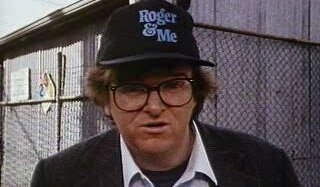|
|
| Tookey's Review |
|
| Pro Reviews |
|
| Mixed Reviews |
|
| Anti Reviews |
|
| Cast |
|
| |
 |
| |
| Released: |
1989 |
| |
|
| Genre: |
DOCUMENTARY
COMEDY
|
| |
|
| Origin: |
US |
| |
|
| Colour: |
c |
| |
|
| Length: |
90 |
|
| |
|
| |
|
|
| |
|
|
A comic portrait of Flint, Michigan, once the birthplace of General Motors but now the unemployment capital of America. Here, rats allegedly outnumber the declining human population by 50,000. The most thriving enterprise is the city jail. It had the dubious honour of being voted by Money Magazine "the worst place to live in the United States".
|
Reviewed by Chris Tookey
|
|
Had it been made by Jessica Mitford, Roger and Me might have been called The American Way of Unemployment. Out-of-work journalist Michael Moore had the apparently unpromising idea of making a low-budget documentary about his hometown's attempts to arrest its decline, and about his own attempts to invite General Motors chairman Roger Smith to see for himself the human impact of his managerial decisions.
The result - amazingly - is a highly entertaining comedy. Mr Moore has a fine talent for satirical observation, and provides a sardonic commentary which would not disgrace Woody Allen or Garrison Keillor.
His subject-matter, admittedly, offers plenty of scope for satire. Ronald Reagan's response to the crisis in Flint was to take six workers out for a pizza. The city fathers' attempts to transform the town into a tourists' paradise were no less hilariously misconceived, and considerably more expensive.
And there is something hilariously insensitive about GM's Chairman, Roger Smith, following up a programme of plant closures by voting himself a 2 million dollar pay rise. In the most telling juxtaposition of the film, we see Roger Smith spouting platitudes to his managers about "individual dignity" and "the warmth of human companionship" two days before Christmas, while ex-workers on his assembly line are being evicted from their homes.
Unfortunately, as a documentary the film has many faults. It distorts chronology (events over ten years have been compressed into two), and juggles the order of events for comic effect. Worse, it takes an emotional, parochial and simplistic view of a large and intractable problem: the failure of the American car industry (and, arguably, American industry as a whole) to adapt to changing conditions in the 1980s.
This failure was not totally the fault of one management, let alone of one manager; and Roger Smith, the elusive target of Mr Moore's hatred, is a scapegoat rather than a genuine villain. If Roger spends much of the film avoiding Michael, Michael spends all of the film avoiding difficult questions, such as whether employees are - in the long run - better served under the kind of "caring", union-dominated economic system which he evidently advocates.
|
|
|
|
|
